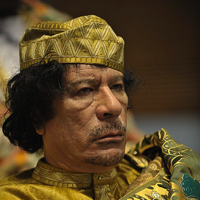For the authoritarian leader, holding onto power is both an art and a science. Much depends on crafting a strategy to deal with the unique social and political characteristics of a given country. However, autocrats also take cues from events in foreign countries and build their institutions accordingly. Many observers of global politics are watching China and North Korea to see if protests and unrest currently roiling the Middle East will spread there. The leaders of China, Myanmar, North Korea and other authoritarian states are watching North Africa just as closely, in order to learn what to expect next.
One thing they'll be trying to determine is why the revolutions in Tunisia and Egypt succeeded, at least to this point, while the rebellion in Libya appears to be flailing. Political scientists are already arguing over the answer this question, as will historians when the passage of time makes it appropriate and proper to do so.
In the absence of a definitive response, however, it is instructive to examine the differences between the armies of Hosni Mubarak and Moammar Gadhafi. Although a conscript force, the Egyptian army has a professional officer corps. As an institution, the army maintained its discipline throughout the revolution. By contrast, the less-organized Libyan army began to disintegrate as soon as Gadhafi appeared vulnerable, with high-profile and very public defections from the navy and air force. As a result, a growing number of analysts are arguing that military professionalism represents at least one of the factors determining the success and failure of the revolutions of the Arab Spring.

